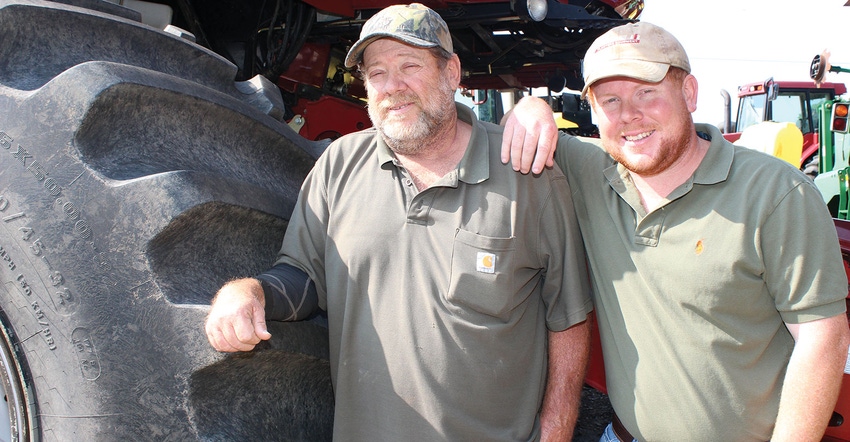
You may not be familiar with the history of how and why Italians immigrated to the Mississippi Delta years after the Civil War. It is a fascinating story that led to decades of crops being sown on seemingly endless rows of rich Delta soil by multi-generational Italian farming families.
For over 40 years Lawrence Reginelli has been embracing and continuing that Italian family farming tradition handed down to him from his father. “I’m the second generation of my family to be born in this area,” says Reginelli, who today farms 4,000 acres in the rural outskirts of Shaw, Mississippi. “My grandparents came over from Italy on the boat hanging their dreams on the hope of a better life.”
Reginelli’s father, Robert, and uncle, Fred, farmed together for over 40 years and have always played an integral role in helping Lawrence on the farm. When Robert Reginelli’s time in the armed services was nearing an end, the Army tried to lure him into re-enlisting, but the dangling carrot of a promotion was not enough to keep him away from his true passion – farming. So back to the Mississippi Delta he went.
Through the Years
Lawrence started learning to farm before he earned degrees in Chemistry and Biology from Delta State University. His youngest son, Brad, graduated from Mississippi State University with a Business degree. They have been farming together ever since Brad returned home in 2010. Brad and his brother Brian live in the same house in which their grandfather lived. Their farm shop is located across the highway from another long-standing Italian family in Shaw – the Baioni family. “Our children grew up playing baseball and eating pizza pies with Victor and Martha Ann’s children,” remembers Reginelli. “When the state came in to build the highway, they took two acres of my grandparent’s land through eminent domain and left a deep pit we all used to play softball in before topsoil covered the sandy bottom allowing rain to eventually fill it. Those were fun days.”
L&N Reginelli Farms was all dryland back when Lawrence and his wife Nancy, now a retired RN, started building their life together. While he worked the land, she kept the books and kept the family fed. One period in 1980, when the temperature stayed above 100 degrees for 14 days, almost drove them out of farming. “We didn’t make a crop for nothing that year. Our cotton was so short, we had to use an old Allis Chalmers cotton stripper to harvest it,” remembers Reginelli painfully. “Rain finally came, but by the time we found the stripper, we had to put combine tires on it to keep from getting stuck. My father and uncle walked next to the head pulling stalks out of the fingers when it clogged up. It was a mess.”
To illustrate the nature of both farming and weather, the previous year was one of the best crops Reginelli ever produced.
Of the 4,000 acres the Reginelli’s farm today, only 400 lack irrigation. They landform every field with a one-tenth foot drop every 100 feet. Brad handles all irrigation logistics that includes over 50 miles of poly-pipe. They are very aware and mindful of the pressure farming is placing on the Mississippi River Valley Alluvial Aquifer, and plan on installing soil sensors in time for next year’s crop. “We use Computerized Hole Selection on all our poly-pipe and have installed flow meters as well,” says Brad Reginelli. “We basically farm on a sand pit. That’s why corn and rice are farmed many places across the Delta – to put organic matter back into the ground and try to improve the texture of this land.”
Crop Mix, Pests and Moving Forward
When cotton’s price went south in 2014, Reginelli got out of cotton, but may plant a few hundred acres in 2019. He still has one six-row and two four-row pickers. He was President of Columbus Gin for eight years and always ginned his cotton there until it was shuttered in 2014. “I guess I’ll work with a gin in Clarksdale next year,” says Reginelli.
He and Brad sit down before each season, discuss their potential crop mix, review applicable disease packages, and always rely on the independently-tested variety trials information provided by Mississippi State University’s Extension researchers.
They are lucky when it comes to levels of pest pressure through the years. Lawrence admits, even prior to the Boll Weevil Eradication Program (BWEP), weevils never gave him headaches, but he knows they would have eventually. “The BWEP was, of course, necessary,” says Reginelli. “It protected and ensured the future of cotton production in this country.”
Like most farmers in the Delta, hooded sprayers are standard operating procedure on L&N Reginelli Farms. All of his soybean varieties are Dicamba-tolerant, and he has never had one drift complaint. “We’ve had good farming neighbors through the years, and if anyone ever has a problem or concern, we talk through it rather than argue,” adds Reginelli.
Lawrence knows Brad is waiting in the wings to take over the operation when he parks his farming career in the shop. “The first year I started farming, an older grower told my cousin Steve Sandroni and me, ‘…boys, y’all will make 40 crops and die…’, but I’m not dead yet,” laughs Reginelli.
After getting rear-ended twice in the last two years while driving his truck, Reginelli’s gait is a little slower than it used to be, but he looks forward to filing up his bins with another year’s grain harvest. “I wish I had booked more soybeans at $10.50,” laughs Reginelli. “I guess I can keep them stored as long as my flour barrel doesn’t go empty.”
That is an appropriate colloquialism which probably reflects the mindsets of generations of hard-working Italian farmers.
About the Author(s)
You May Also Like




